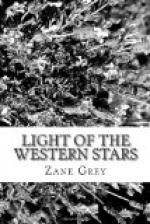Madeline, like a prisoner in a cell, began again to pace to and fro.
“Oh, it is all terrible!” she cried. “I am his wife. His wife! That meeting with him—the marriage—then his fall, his love, his rise, his silence, his pride! And I can never be anything to him. Could I be anything to him? I, Madeline Hammond? But I am his wife, and I love him! His wife! I am the wife of a cowboy! That might be undone. Can my love be undone? Ah, do I want anything undone? He is gone. Gone! Could he have meant— I will not, dare not think of that. He will come back. No, he never will come back. Oh, what shall I do?”
* * *
For Madeline Hammond the days following that storm of feeling were leaden-footed, endless, hopeless—a long succession of weary hours, sleepless hours, passionate hours, all haunted by a fear slowly growing into torture, a fear that Stewart had crossed the border to invite the bullet which would give her freedom. The day came when she knew this to be true. The spiritual tidings reached her, not subtly as so many divinations had come, but in a clear, vital flash of certainty. Then she suffered. She burned inwardly, and the nature of that deep fire showed through her eyes. She kept to herself, waiting, waiting for her fears to be confirmed.
At times she broke out in wrath at the circumstances she had failed to control, at herself, at Stewart.
“He might have learned from Ambrose!” she exclaimed, sick with a bitterness she knew was not consistent with her pride. She recalled Christine’s trenchant exposition of Ambrose’s wooing: “He tell me he love me; he kees me; he hug me; he put me on his horse; he ride away with me; he marry me.”
Then in the next breath Madeline denied this insistent clamoring of a love that was gradually breaking her spirit. Like a somber shadow remorse followed her, shading blacker. She had been blind to a man’s honesty, manliness, uprightness, faith, and striving. She had been dead to love, to nobility that she had herself created. Padre Marcos’s grave, wise words returned to haunt her. She fought her bitterness, scorned her intelligence, hated her pride, and, weakening, gave up more and more to a yearning, hopeless hope.
She had shunned the light of the stars as she had violently dismissed every hinting suggestive memory of Stewart’s kisses. But one night she went deliberately to her window. There they shone. Her stars! Beautiful, passionless as always, but strangely closer, warmer, speaking a kinder language, helpful as they had never been, teaching her now that regret was futile, revealing to her in their one grand, blazing task the supreme duty of life—to be true.
Those shining stars made her yield. She whispered to them that they had claimed her—the West claimed her—Stewart claimed her forever, whether he lived or died. She gave up to her love. And it was as if he was there in person, dark-faced, fire-eyed, violent in his action, crushing her to his breast in that farewell moment, kissing her with one burning kiss of passion, then with cold, terrible lips of renunciation.




